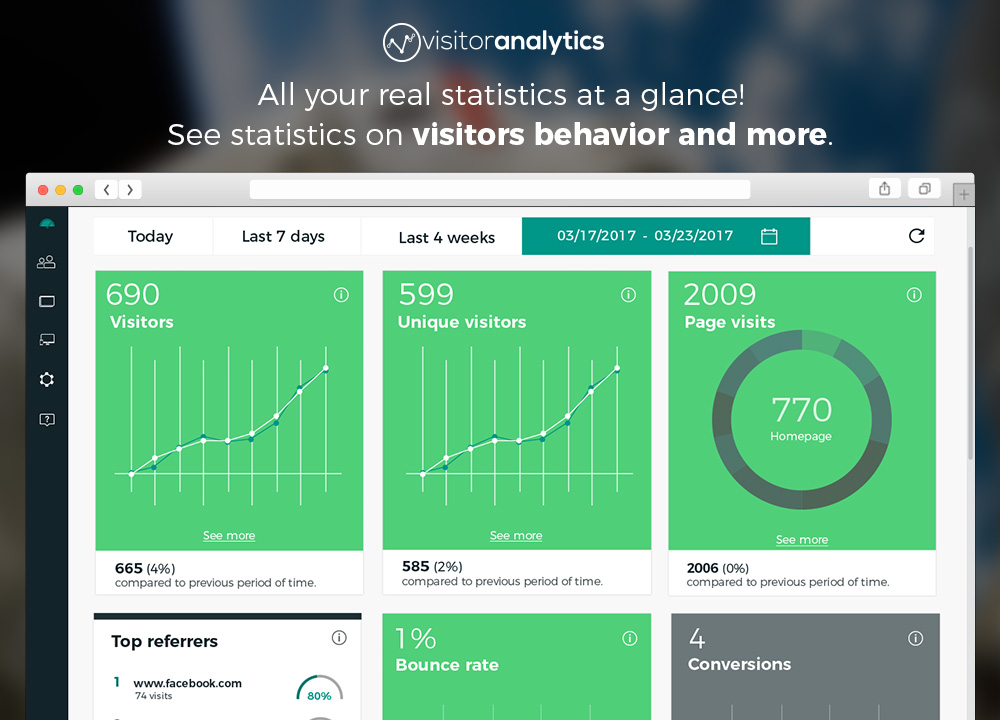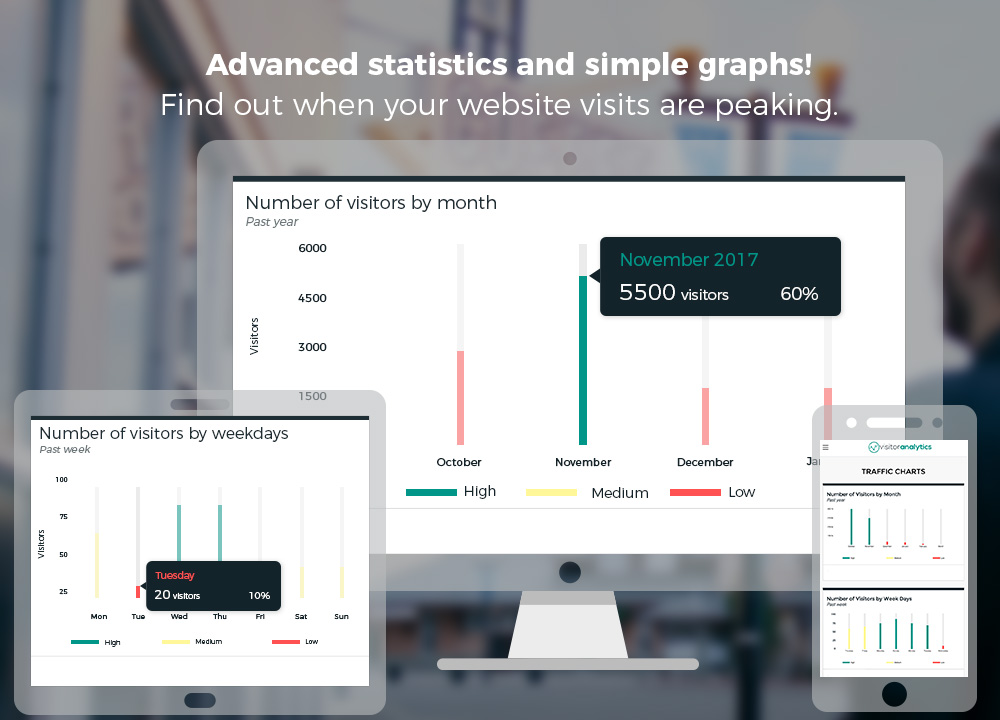We started Startup of the Week interviews and the startup community asked for more. So here we are, with the first article from a new series named Startups: The Beginnings!
We want to capture the early days of a successful startup, the crucial steps that come after the idea and the (needed) commitment to execute.
There are a bunch of articles and speakers that describe their journey and startup life, however for various reasons, they tend to jump over this really early stage.
The purpose of Startups: The Beginnings is to expose as many early stage stories as we can, in order to provide a few advices for young entrepreneurs.
Of course, we are not trying to hand over a set steps or a framework. A trend or pattern will arise from all the stories, but you will also see that each of them has its own particularities and no two entrepreneurs are alike.
For this first article, we had a chat with Andrei Homorodean (CEO) and Corina Stirbu (CMO) from Visitor Analytics. Here is their startup journey in a nutshell!
Tell us a bit about your background and how did you started your entrepreneur life – to name it so?

Andrei: I have a technical background. I finished Computer Science in 2012 and right after it I did an internship at Google in the Gmail load balancing team. Basically, my first job/internship was in Sillicon Valley, the heart of startups and tech industry. During uni I freelanced together with a friend from Germany, but right after my Google experience, we decided to open an outsourcing company.
Of course, time has passed and now I am way more focused on the product than code, but I still have a technical approach.
The outsourcing company still exists, we are around 17 employees in Cluj and some more in Munich. We are working strictly with startups for a long term partnership and are involving ourselves more than an usual contractor.
I do not believe in traditional outsourcing.

Corina: I am not an entrepreneur (yet), but long story short: I’m a high critical thinker, graduated environmental engineering (yes, really) and started doing PR&Marketing vor various projects in 2012-ish. First it was an european NGO focused on technical matters and, in just a few years, I did the PR&marketing side for various events, business consultancy companies, creative agencies, a coworking space and various small startups in their very early stage. And then, I met this guy (pointing out Andrei) and he almost convinced me that his idea is briliant. So I changed the city, quit my job and came here.
It was a good choice. The idea is brilliant. (haha) 🙂
Oh, wow! Seems like an entire career journey for both.
Tell us a bit more about Visitor Analytics. What is it?
A: Well, we started from the idea that simplicity is the keynote for success and that not everyone is a tech-savy user; So we created a friendly analytics app.
Basically, we provide everything that one has to know about their stats using a simple interface and a friendly user experience for non-techies, unlike the 44+ menu options from Google Analytics.
Don’t get me wrong – Google Analytics is great. But one has to be a marketing or data analyst to go through it. 🙂

And when did all this idea started?
Andrei: In August 2015, as a side project in the outsourcing company that I just mentioned. It took some months to develop the product, but we launched in December 2015. The thing is that we launched an MVP that escalated quickly and from there until 3 months ago, almost all our time has been spent solving scalability issues.
Just to give you an idea of what does this mean: right now we have around 2000 installs per day. That means that 2000 websites install our application and they send us their traffic. So you can imagine, 450.000 websites/users who transfer their traffic to us. Of course not all websites are very visited, however there is a lot of traffic cumulating.
So everyone can see their stats no matter where their website is? Or you’re available on specific platforms?
A: Right now, we are in the Wix market and we are planning to go on multiple markets in the following months. We were a bit slow in extending because we are dealing with a large volume of data and we also wanted to develop the best product that we could, before entering other markets. But it will happen really soon – just keep an eye on us!
Wix – this is a bit unsual.
Why did you initially chose Wix over WordPress or other platforms ?
A: First – because I have also developed other products for Wix and I knew the market and I find it a good place to start, since the users are already used to pay the products.
Plus Wix it is IPO’ed for some time now and they have a money focused strategy. Compared to other platforms that are more open source oriented.
C: On the other hand, WordPress users for example are not used to paying applications. Most of them are just building a blog or a presentation website and they are not necessarily buying plugins.
A: Also WordPress is a bit more different than Wix, since you can access the code of the application and modify it, while on Wix you do not have this possibility. The platform is built as a drag and drop and the average user does not have access to the back-end. And these are the users that we are targeting.
Why Visitor Analytics ? How did you come up with the idea ?
A: Having a company for the past 5 years, with a lot of projects together where we had to deal with a lot of clients — we faced a broad spectrum of technical skills from their side. There always would come a moment when we installed Google Analytics on their website and they were having difficulties understanding what is going on.
This was the first motivator, after that – we tried searching for something that could be used for a large majority of websites. An analytics tool is pretty broad and universally used. From the 100 million users of wix, we have an app that we can use for any of these websites. We believe that a good app is the one that has a universal character, so it can have a wide reach and applicability on the market place.

So, the idea validation came from working experience, right?
A: Yes you could say that. Plus we have studied the market and we found out we were up against a single competitor, which had a very outdated app.
Was this study very elaborate ?
No, not really, we just had a look in the market place. There aren’t many applications in the market place — around 200+ applications. So it is not like you have to go through a lot.
C: The app that was already in the Wix market was very rigid and the provided info was very limited. It did not offer a lot of relevant stats and the UI/UX was 90-ish like.
Plus, if you wanted to use Google Analytics on your Wix site you could only do this if you were a premium user of Wix. And even if you are, in order toadd the tracking code you go through a pretty complicated process. So the people were more inclined to pay $5 for our app, instead of paying a premium membership for Wix.
Of course, we have targeted these people.
Ok, but what are the next steps after you have validated the idea and took the decision to build an Analytics tool? What happens the next day – asking for a friend 🙂 ?
A: We started from a favoured position a bit. We were an outsourcing company at that time, so basically we already had the resources to work at other projects.
I didn’t have to quit any job, but Visitor Analytics was always a priority.
This is the advantage of bootstrapping a product in another company, the fact that you do not have the urgency that it has to succeed in two, three, six months. Thinking about it, from launching to having our first employee on the product, it took somewhere around two to three months.
There were two developers at the beginning for the first few months who have worked on Visitor Analytics. Also on Wix there is an process of review and accept. In order to get into the Wix marketplace takes between three months and six months.
With the MVP that we launched it took one year of focusing on scaling. The MVP crashed many times as we got bigger, we had to continuously buy new servers and now we have 16 servers around the world and 15 code repositories.
After refactoring, the app has been built in such a way that if we switch to WordPress we do not have to duplicate our code and start a new project. On the frontend we have react.js, rest API with PHP Symphony and Mongo DB on the back-end.
C: We actually crashed a lot of times due to the unexpected initial success. It wasn’t perfect – we knew that, but we saw it like an MVP that will be developed more and more. It just went big very fast.
A: Our first scaling failure was on 3rd of January 2016, right after new year’s eve a lot of people started to create a new business/ sites and we had a lot of installs. So in that day we had a white screen of our application.
We had a lot of sleepless nights back then. It was not fun.
And who dealt with use case gathering. Who came up with the features ?
A: The majority of the product was done by me. We have looked at similar tools to see how they present the information, and we simplifed the content as much as we could.
Even now, we are improving the app based on the way our users’ experience. For them the best use case is to have a dashboard where a summary of all the statistics are presented.
C: To make it clear, we have a Version 1 (V1) which has been scaled. Now that we are more stable and want to enter other markets, we have gathered feedback from our current users and went through all the support requests.
We analysed how they use the app and how what do they need and we develop a Version 2 (V2) – which will be released on other markets tpp and will have also a mobile version. As far as we analysed the data, most of the users would have a look at the dashboard and if they could not find what they were looking for, they would write us an e-mail to support.
Since Wix is a drag and drop platform, where users can add what they want, we thought about placing all the info on the overview and offer them the possibility of customizing it in the same way this happens with the website.
We could say thet the users had the biggest input on the V2. Now we will also customize the app based on the market. If we will go on Shopify for example the requirements should be more focused on conversion and ecommerce related.
A: In the long run we would also like to go towards video recording and heat maps and offer more advanced analytics tools. But for now, we are focusing on integrating with as many platforms as possible.
What was the go to market strategy?
A: For us it was a bit more simpler. Once you have managed to get into the market, people will see you there. It is a bit more simpler than a product that you launch on the web and you hope that people will install it.
C: Everything that we have until now is organic, actually.
Right now, the users are coming to us through Wix since we are in the recommended apps, we have 5 stars in the market and we are also maintaining a close collaboration with the developers at Wix. we even visited them to get their feedback on the product.
This has managed to get us a lot of visitors, without paying ads.
Who helped you on your journey? Did you have any mentors ?
The previous experience had the biggest impact on my journey. We have worked with the (now ex) Spherik team and they helped us a lot. We are very thankful for it!
We went through a lot of training sessions to improve our pitching and they also advised us product wise. Even though we started to work with them in May 2016 and the product was launched in 2015, it was a really good collaboration. For five to six months we have spoke quite a lot and we can definitely say that they were the most relevant mentors for us.
What is the plan for the following months ?
C: First of all we want to go on other markets, create a mobile app and create a standalone version that can be integrated no matter the website platform. Of course, we want to launch the faimous version 2, where we have improved the UX a lot, added a few more statistics and we plan to hire more people.
How did you find the first product employees ?
On the one hand from recommendation. On the other hand…– actually, all of them came from recommendations. 🙂
Flash Questions
Motivation or Discipline ? Which one is more important ?
Discipline all the way.
What is the skillset that an entrepreneur should posses ?
Good team motivator and leader.
Patience.
Stress Resistant.
Action focused.
Alexandru Selejan
Latest posts by Alexandru Selejan (see all)
- Startup the beginnings: Techsylvania and Codiax - September 13, 2017
- Visitor Analytics: The beginnings - June 22, 2017
- Innovation Labs - May 25, 2017
